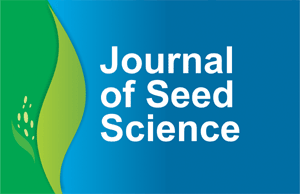Abstract:
Seed deterioration is a continuous irreversible process that affects cell structures and molecules and compromises the physiological quality of seeds. This study aimed to assess the effect of artificial wheat seed deterioration on germination and seedling performance. The TBIO Toruk wheat cultivar was used, with seeds submitted to different artificial aging times (2, 3, 4, 5, 6 and 7 days). The original and aged seed lots were submitted to laboratory germination and seedling performance tests (seedling length, seedling dry weight and endosperm dry weight). Alpha-amylase activity, electrical conductivity and the oxidative stress marker malondialdehyde were quantified. The exudate resulting from the electrical conductivity test was separated to quantify total soluble sugars, soluble proteins and phosphorus. The deterioration process increased lipid peroxidation and decreased initial alpha-amylase activity. During germination, the most deteriorated lots exhibited greater solute loss and lower alpha-amylase synthesis capacity. The lots with the greatest deterioration showed reduced viability and produced worse-performing seedlings.
Index terms:
alpha-amylase; deterioration; malondialdehyde; physiological quality; Triticum aestivum L
